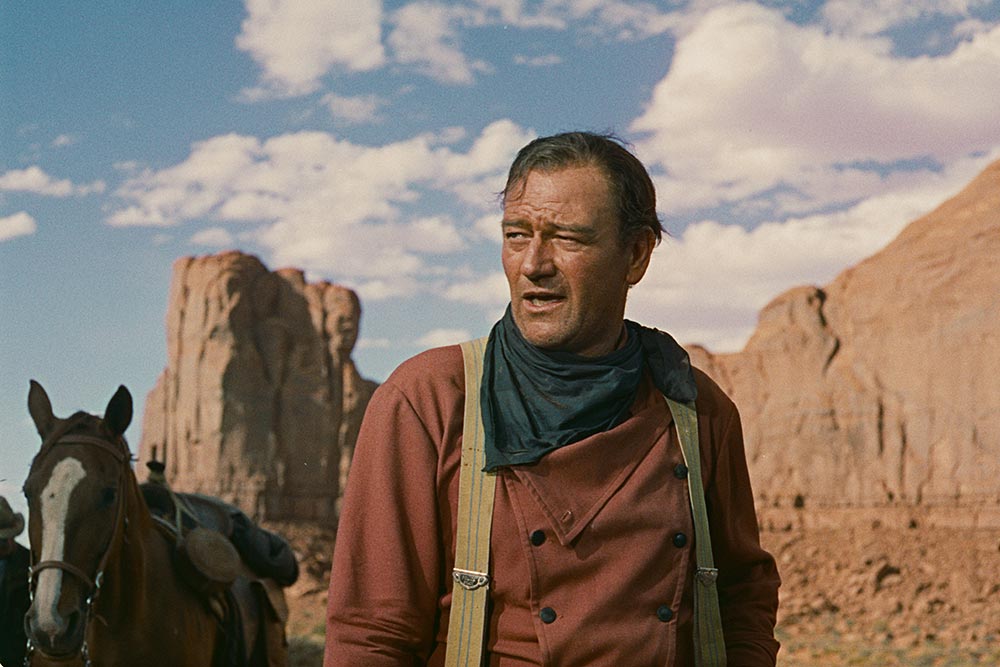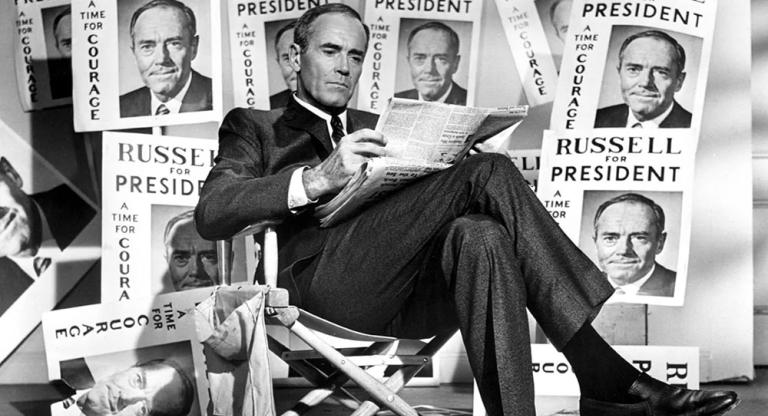John Wayne’s Ethan Edwards is the central character and conundrum of John Ford’s astonishingly beautiful, thematically complex, and emotionally wrenching film The Searchers (1956). A rugged free man who wanders the wide open West after serving in the Confederate army, Ethan is also a dangerously obsessed racist loner who loves his brother’s wife, and who wants to find his kidnapped niece and kill her because—in his anguished mind—she has been defiled by her Comanche captor. “How do you not love this disgusting bigot?” asks the critic-and-filmmaker Scout Tafoya about Ethan in his book, But God Made Him a Poet: Watching John Ford in the 21st Century.
Tafoya, who wrote his excellent 2023 study after viewing every available Ford film during the pandemic, is just one of the many filmmakers and writers to fall under the spell of The Searchers, an American quest movie whose every frame feels larger than life. The film’s tragic drama is magnified by the widescreen VistaVision images of its gigantic landscape and time seems to expand as Ethan’s search drags on for years, giving it a cosmic feel in scope. But The Searchers’s story is not abstract, it is grounded in Ford’s attempt to confront dark truths about American history, particularly the racism that fueled Manifest Destiny and countless Hollywood westerns.
Jean Luc-Godard was the first major director to marvel at The Searchers’s unsettling power. In a 1959 essay for Cahiers du Cinéma, he compared the movie’s ending to “Ulysses being reunited with Telemachus” and in 1963 he chose it as the fourth greatest American sound film, after Scarface (1932), The Great Dictator (1940), and Vertigo (1958). In Sight and Sound’s 2022 critics survey—where The Searchers ranked as the fifteenth best movie of all time—the film scholar Martin Rubin acknowledged “its red-face casting and other representational archaisms may rankle contemporary sensibilities, but this stirring, stunningly visualized western saga remains a profoundly ambivalent exploration of both the noblest and darkest impulses that lie at the heart of American history and consciousness.”
With its obsessive antihero and blend of visual grandeur, hard-edged skepticism, enigmatic narrative lacunae, and the way it favors pregnant silence over expository dialogue, The Searchers is the prototype for the modern American epic. It continues to fascinate because it was both of its time and ahead of its time. Many filmmakers have paid homage to and reinvented Ford’s masterpiece, but none more frequently than Martin Scorsese. In Who’s That Knocking at My Door (1967) he has Harvey Keitel praise Ford’s film and in Mean Streets (1973) Keitel takes his friends to see it in Times Square. Then, in Taxi Driver (1976), he has Keitel embody the Comanche character Scar. After all, Taxi Driver (1976) is essentially a gritty urban Searchers remake with Robert DeNiro’s Travis Bickle as Ethan Edwards and Jodie Foster as Debbie, the object of the search who doesn’t want to be rescued. Like Ethan, Travis is a loner and war veteran with a repressed sexual frustration that turns violent. Just three years after Taxi Driver, its screenwriter, Paul Schrader, wrote and directed Hardcore (1979), another variation on the theme starring George C. Scott as a father searching through California for his daughter, who also doesn’t want to be rescued.
When The Searchers was released in 1956, the psychological underpinnings and social critique of Ford’s film were largely ignored. It was received as a standard, albeit very well-made genre film. The western was, by far, the most popular genre during the cinema’s first half-century and its pleasures were usually meant to be simple: thrilling action scenes and clear-cut heroes and villains. A few months before The Searchers, the CinemaScope western Comanche! (1956) opened in New York, with ads promising “The savage cry of tomahawk terror that swept the West!” While stories about the growing efforts to end segregation in the South filled the front pages of the newspapers, the movie ads made it clear that westerns were not to be watched for any serious consideration of America’s long history of racial anxiety. In its newspaper advertisement, The Searchers was simply touted as “the biggest, roughest, toughest, and most beautiful picture ever made.”
When Ford made The Searchers, he was among Hollywood’s most respected directors. He had won four Best Director Oscars, for The Informer (1935), The Grapes of Wrath (1940), How Green Was My Valley (1941, beating Citizen Kane), and The Quiet Man (1952). These prestige films aside, he particularly loved westerns—he directed more than thirty—and The Searchers was his return to the genre after six years. Unhappy with his experience making Mr. Roberts (1955), during which he argued frequently with Henry Fonda, Ford gathered his favorite collaborators and headed to his favorite location: Monument Valley, with its stark, unearthly grandeur, and its distance from meddling Hollywood executives. The Searchers was his chance to both reflect on, and perfect the genre that defined him. (“I’m John Ford, I make westerns,” is how he famously introduced himself at a 1950 Directors Guild meeting).
The film opens with one of cinema’s most indelible images. A door opens, and out of the blackness, we see a stunning desert landscape dotted by red plateaus and mesas. A woman at the door is seen from behind, a man approaches on a horse. Within minutes, we are introduced to the achingly close but forbidden connection between Ethan Edwards and his brother’s wife, Martha; we are also introduced to the underlying tension between the domestic warmth of the family home and the irresistible call for adventure that tugs at Ethan. Indeed, the song that plays during the opening credits asks the elemental questions that the film never fully answers: “What makes a man to wander, what makes a man to roam? What makes a man leave bed and board and turn his back on home?”
John Wayne’s performance is a marvel. Has any actor in a talking picture ever expressed so much in a film without dialogue? Nearly all of the film’s violence occurs offscreen. We only feel the impact and horror through Wayne’s reactions, just as we only feel the agony of his repressed love and the power of his rage through his physical performance. As Andrew Sarris astutely observed in a 1971 Film Comment appreciation, “the dramatic struggle of The Searchers is not waged between a protagonist and an antagonist, or indeed between two protagonists as antagonists, but rather within the protagonist himself.”
Wayne was not only underappreciated as an actor, but he became reviled by much of the public in the 1960s for his right-wing politics, especially his unabashed support of the Vietnam War. In this way, Wayne—the film’s greatest treasure—also became an impediment to The Searchers’s reputation, along with the unfortunate, albeit then-conventional, use of white actors with red makeup as “Indians,” including the German actor Henry Brandon as Scar. In his essay, “Defending the Searchers,” the novelist Jonathan Lethem writes eloquently about his years-long quest to justify his obsession with the film. Ultimately, and despite both objections and disdain from his friends, he concludes that “The Searchers strides on, maddened, through broken landscapes incapable of containing it.”
Like the highest plateaus in Monument Valley, The Searchers stands above all other westerns, and nearly all films, for the mere perfection of its craft at every level, and for the complex nature of its narrative and moral ambiguity. We never learn exactly where Ethan came from before he arrives at his brother’s house and we don’t find out where he’s going when he leaves at the end. We are also never quite sure about how to feel regarding the violence perpetrated by and against the Comanches. There is a chilling and unexpectedly comic moment when Ethan and Scar meet, in which Ethan says, “You speak pretty good English for a Comanche. Someone teach you?” To which Scar later retorts, “You speak good Comanche for a white man. Someone teach you?” Caught in a vicious cycle of violence and revenge, Ethan and Scar somehow understand and hate each other. It is impossible to view one as good and the other as evil because they represent two sides of the same coin.
The Searchers screens this evening, July 18, and through July 21, on 70mm at the Museum of the Moving Image as part of the series “See it Big: 70mm!”
gd2md-html: xyzzy Thu Jul 18 2024



